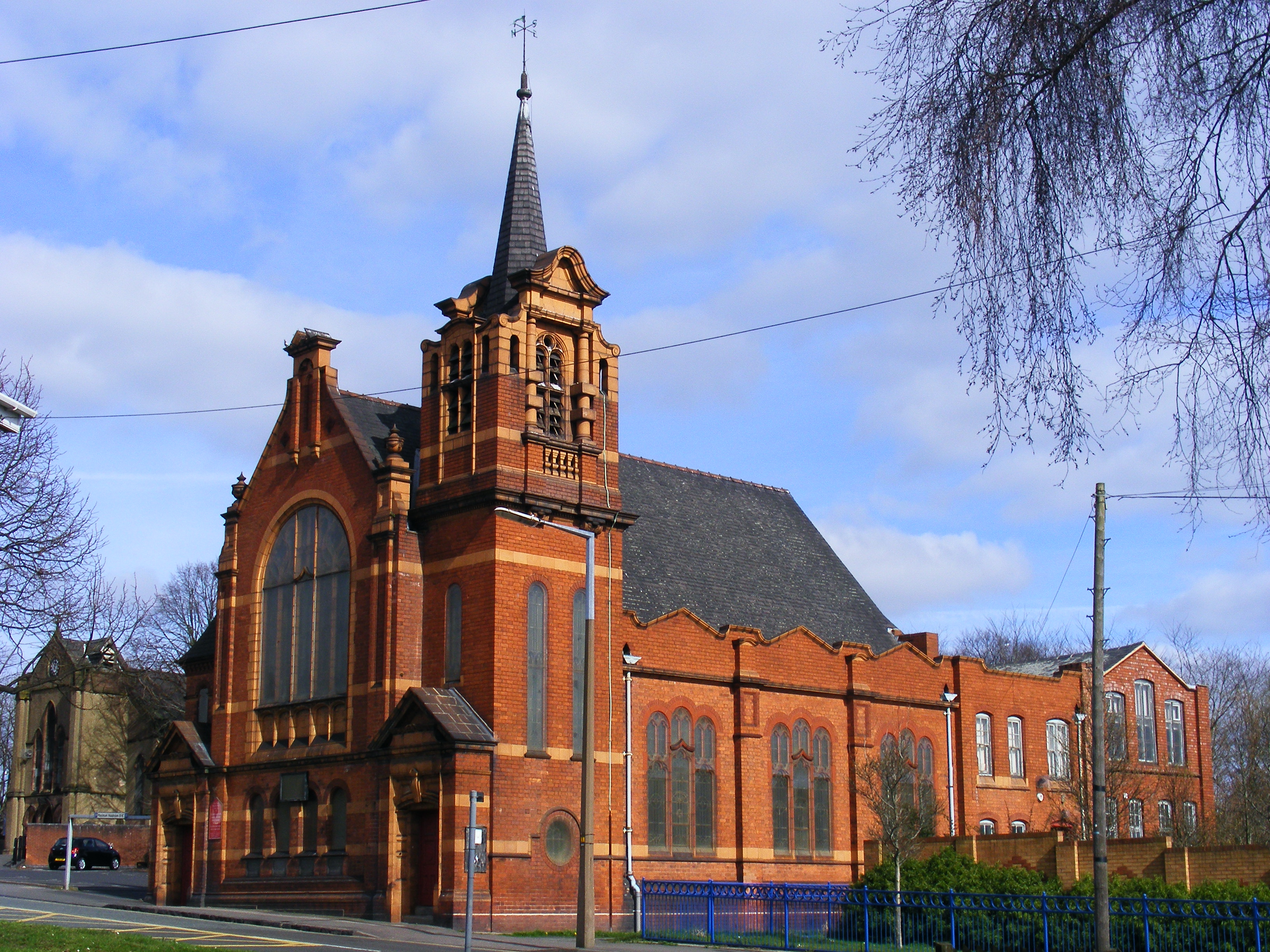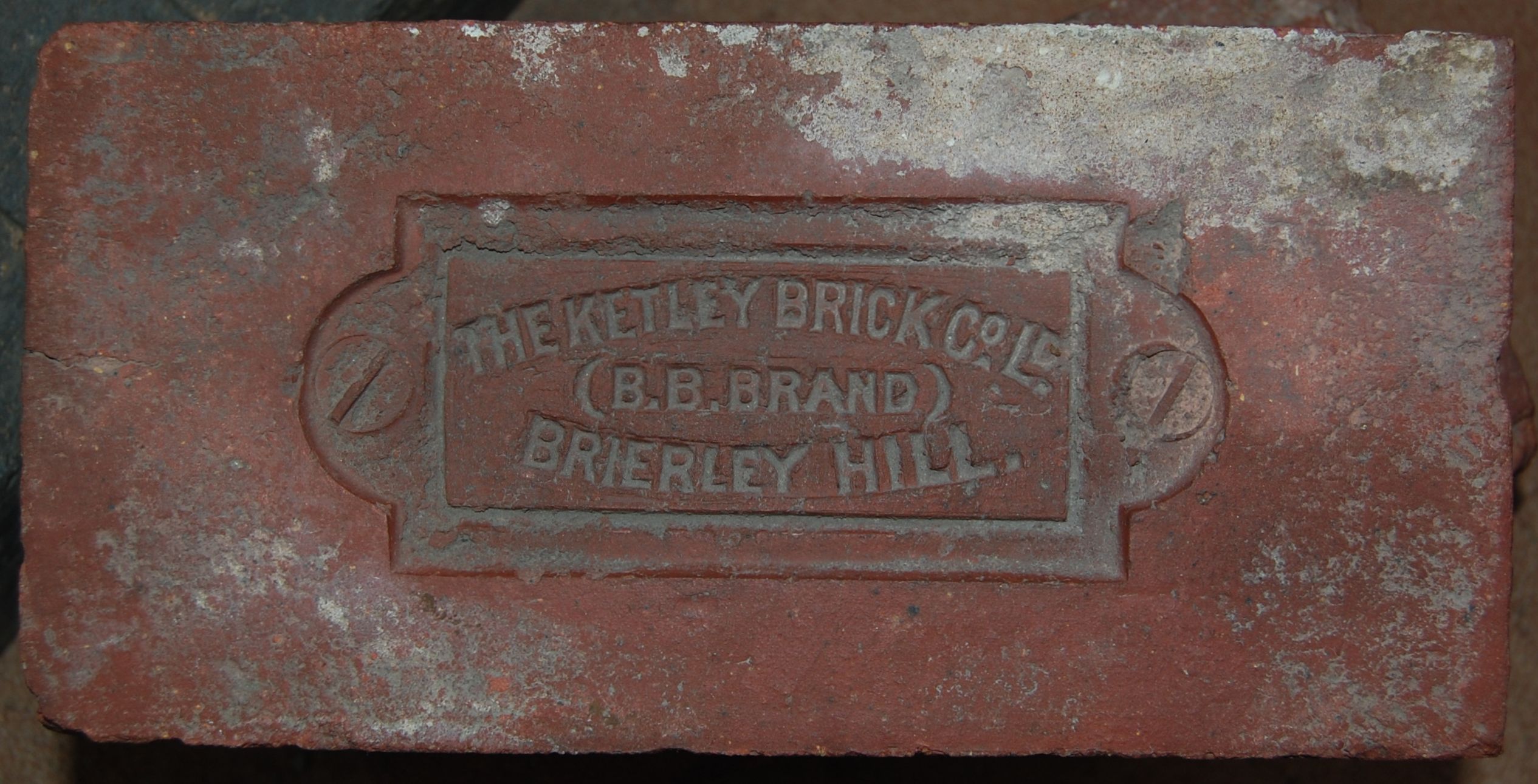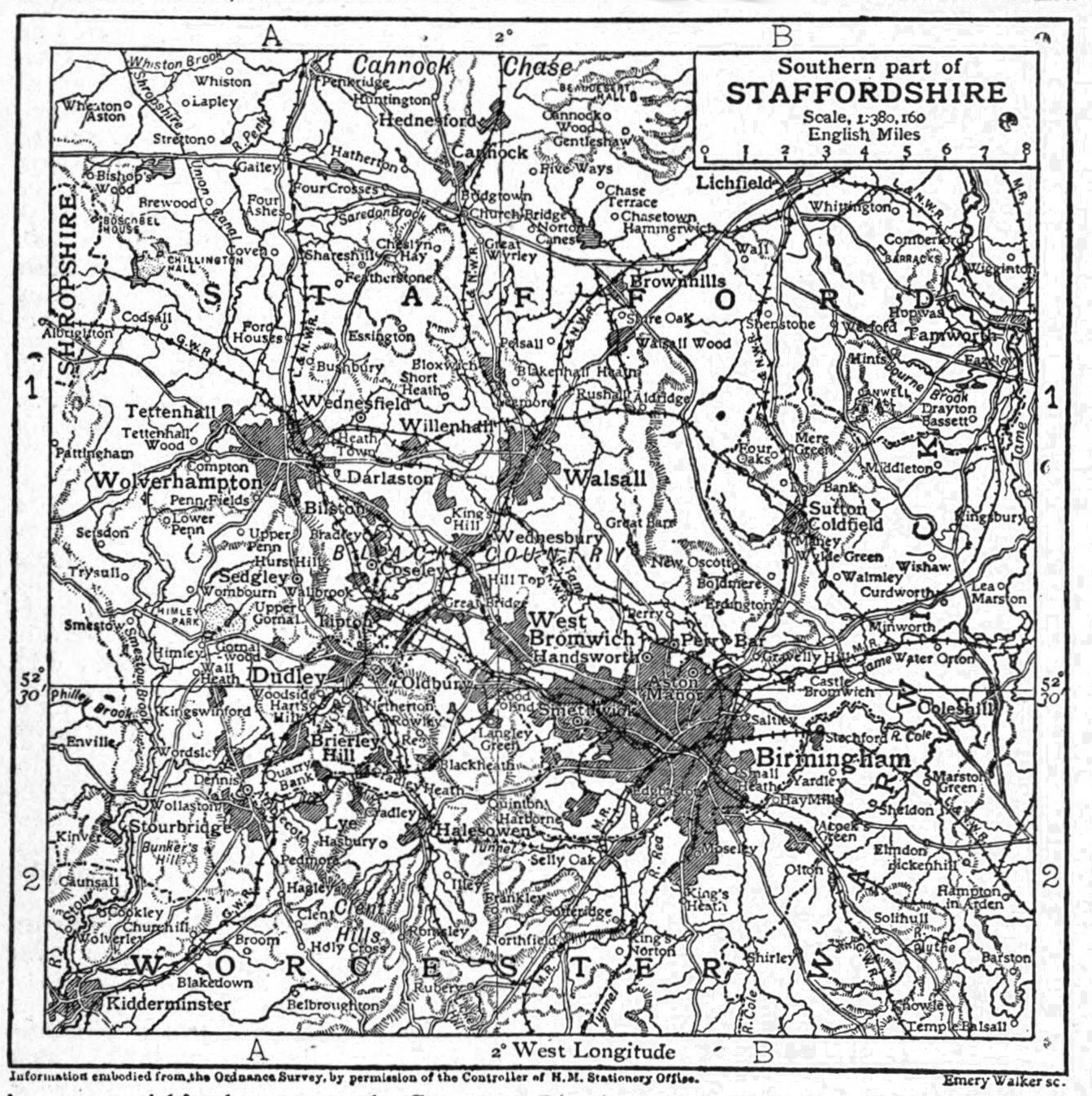|
Cradley Heath Baptist Church
Cradley Heath Baptist Church, also known as Four-ways Baptist Church, was the first Church of any denomination to build a chapel in Cradley Heath, West Midlands. The first meeting was in December 1833, in Grainger's Lane. Later, land was bought near the Four-Ways end of the High Street, and a meeting place was built. The site was expanded, and two further buildings were built, the last in 1904. The church building is Grade 2 Listed. The church is noted for appointing Britain's first recorded black West Indian pastor, Rev. George Cosens (or Cousens), in 1837. Origins Cradley Heath Baptist Church began as an offshoot of Cradley Baptist Church in 1833. The Minister, Rev. Jabez Tunnicliff, read a verse from the Bible which challenged his theology. He paused so long in his sermon that some of the officers thought he was ill. He continued the sermon, but began Bible study which led him to part, amicably, with Cradley Baptist Church. A total of 34 others (though one retu ... [...More Info...] [...Related Items...] OR: [Wikipedia] [Google] [Baidu] |
Cradley Heath Baptist Church 01 , a motorcycle speedway team from Dudley, England
{{disambig, geodis ...
Cradley may refer to: * Cradley, Herefordshire, England ** Cradley and Storridge, a civil parish formerly called just "Cradley" * Cradley, West Midlands, a suburb of Halesowen in the West Midlands * Cradley Heath, a small town in the Sandwell borough, in the West Midlands * Cradley Heathens Cradley Heathens was a motorcycle speedway team from Dudley, England. The team was founded in 1947 and competed at the top level of British speedway until its closure in 1995. It was revived as Dudley Heathens in 2010, competing in the National L ... [...More Info...] [...Related Items...] OR: [Wikipedia] [Google] [Baidu] |
Calvinism
Calvinism (also called the Reformed Tradition, Reformed Protestantism, Reformed Christianity, or simply Reformed) is a major branch of Protestantism that follows the theological tradition and forms of Christian practice set down by John Calvin and other Reformation-era theologians. It emphasizes the sovereignty of God and the authority of the Bible. Calvinists broke from the Roman Catholic Church in the 16th century. Calvinists differ from Lutherans (another major branch of the Reformation) on the spiritual real presence of Christ in the Lord's Supper, theories of worship, the purpose and meaning of baptism, and the use of God's law for believers, among other points. The label ''Calvinism'' can be misleading, because the religious tradition it denotes has always been diverse, with a wide range of influences rather than a single founder; however, almost all of them drew heavily from the writings of Augustine of Hippo twelve hundred years prior to the Reformation. T ... [...More Info...] [...Related Items...] OR: [Wikipedia] [Google] [Baidu] |
H B Kendall
Holliday Bickerstaff(e) Kendall (2 August 1844 – 10 March 1919), was a Primitive Methodist Minister, President of the Conference (1901).Leary, W. "Directory of Primitive Methodist Ministers and their Circuits", (1990), p. 121, hb or sb Editor (Primitive Methodist publishing), author and historian, Kendall wrote three separate histories of the Primitive Methodist Church which came to be regarded as the definitive history of the Church.''The Origin and History of the Primitive Methodist Church'' Vol. 1.''The Origin and History of the Primitive Methodist Church'' Vol. 2. B ...
|
Primitive Methodist
The Primitive Methodist Church is a Methodist Christian denomination with the holiness movement. It began in England in the early 19th century, with the influence of American evangelist Lorenzo Dow (1777–1834). In the United States, the Primitive Methodist Church had eighty-three parishes and 8,487 members in 1996. In Great Britain and Australia, the Primitive Methodist Church merged with other denominations, to form the Methodist Church of Great Britain in 1932 and the Methodist Church of Australasia in 1901. The latter subsequently merged into the Uniting Church in Australia in 1977. Beliefs The Primitive Methodist Church recognizes the dominical sacraments of Baptism and Holy Communion, as well as other rites, such as Holy Matrimony. History United Kingdom The leaders who originated Primitive Methodism were attempting to restore a spirit of revivalism as they felt was found in the ministry of John Wesley, with no intent of forming a new church. The leaders were Hugh B ... [...More Info...] [...Related Items...] OR: [Wikipedia] [Google] [Baidu] |
Pastor
A pastor (abbreviated as "Pr" or "Ptr" , or "Ps" ) is the leader of a Christian congregation who also gives advice and counsel to people from the community or congregation. In Lutheranism, Catholicism, Eastern Orthodoxy, Oriental Orthodoxy and Anglicanism, pastors are always ordained. In Methodism, pastors may be either licensed or ordained. Pastors are to act like shepherds by caring for the flock, and this care includes teaching. The New Testament typically uses the words "bishops" ( Acts 20:28) and "presbyter" ( 1 Peter 5:1) to indicate the ordained leadership in early Christianity. Likewise, Peter instructs these particular servants to "act like shepherds" as they "oversee" the flock of God ( 1 Peter 5:2). The words "bishop" and "presbyter" were sometimes used in an interchangeable way, such as in Titus 1:5-6. However, there is ongoing dispute between branches of Christianity over whether there are two ordained classes (presbyters and deacons) or three (bishops, priests ... [...More Info...] [...Related Items...] OR: [Wikipedia] [Google] [Baidu] |
Jamaica
Jamaica (; ) is an island country situated in the Caribbean Sea. Spanning in area, it is the third-largest island of the Greater Antilles and the Caribbean (after Cuba and Hispaniola). Jamaica lies about south of Cuba, and west of Hispaniola (the island containing the countries of Haiti and the Dominican Republic); the British Overseas Territory of the Cayman Islands lies some to the north-west. Originally inhabited by the indigenous Taíno peoples, the island came under Spanish rule following the arrival of Christopher Columbus in 1494. Many of the indigenous people either were killed or died of diseases, after which the Spanish brought large numbers of African slaves to Jamaica as labourers. The island remained a possession of Spain until 1655, when England (later Great Britain) conquered it, renaming it ''Jamaica''. Under British colonial rule Jamaica became a leading sugar exporter, with a plantation economy dependent on the African slaves and later their descenda ... [...More Info...] [...Related Items...] OR: [Wikipedia] [Google] [Baidu] |
Brierley Hill
Brierley Hill is a town and ward (division), electoral ward in the Metropolitan Borough of Dudley, West Midlands (county), West Midlands, England, 2.5 miles south of Dudley and 2 miles north of Stourbridge. Part of the Black Country and in a heavily industrialised area, it has a population of 13,935 at the United Kingdom 2011 Census, 2011 census. It is best known for glass and steel manufacturing, although industry has declined considerably since the 1970s. One of the largest factories in the area was the Round Oak Steelworks, which closed down and was redeveloped in the 1980s to become the Merry Hill Shopping Centre. Brierley Hill was originally in Staffordshire. Since 2008, Brierley Hill has been designated as the Strategic Town Centre of the Dudley Borough. History The name Brierley Hill derives from the Old English words 'brer', meaning the place where the Rosa rubiginosa, Briar Rose grew; 'leah', meaning a woodland clearing; and 'hill'. Largely a product of the Industria ... [...More Info...] [...Related Items...] OR: [Wikipedia] [Google] [Baidu] |
Black Country
The Black Country is an area of the West Midlands county, England covering most of the Metropolitan Boroughs of Dudley, Sandwell and Walsall. Dudley and Tipton are generally considered to be the centre. It became industrialised during its role as one of the birth places of the Industrial Revolution across the English Midlands with coal mines, coking, iron foundries, glass factories, brickworks and steel mills, producing a high level of air pollution. The name dates from the 1840s, and is believed to come from the soot that the heavy industries covered the area in, although the 30-foot-thick coal seam close to the surface is another possible origin. The road between Wolverhampton and Birmingham was described as "one continuous town" in 1785. Extent The Black Country has no single set of defined boundaries. Some traditionalists define it as "the area where the coal seam comes to the surface – so West Bromwich, Coseley, Oldbury, Blackheath, Cradley Heath, O ... [...More Info...] [...Related Items...] OR: [Wikipedia] [Google] [Baidu] |
British African-Caribbean Community
British African-Caribbean people are an ethnic group in the United Kingdom. They are British citizens whose ancestry originates from the Caribbean or they are nationals of the Caribbean who reside in the UK. There are some self-identified Afro-Caribbean people who are multi-racial. The most common and traditional use of the term African-Caribbean community is in reference to groups of residents continuing aspects of Caribbean culture, customs and traditions in the UK. The earliest generations of Afro-Caribbean people to migrate to Britain trace their ancestry to a wide range of Afro Caribbean ethnic groups. African Caribbean people descend from disparate groups of African peoples who were brought, sold and taken from West Africa as slaves to the colonial Caribbean. In addition British African Caribbeans may have ancestry from various indigenous Caribbean tribes, and from settlers of European and Asian ethnic groups. According to the National Library of Medicine the aver ... [...More Info...] [...Related Items...] OR: [Wikipedia] [Google] [Baidu] |
Rev George Cosens
Rev or Rév may refer to: Abbreviations Rev. * Rev., an abbreviation for revolution, as in Revolutions per minute * Rev., an abbreviation for the religious style The Reverend * Rev., the abbreviation for Runtime Revolution, a development environment * Rev., an abbreviation for the Book of Revelation * Rev., an abbreviation for Reverse * Rev., an abbreviation for Revision * Rev., an abbreviation for Revolver * Rev., an abbreviation for Review, as in: ** Chem. Rev. (Chemical Reviews), a peer-reviewed scientific journal ** Phys. Rev. (Physical Review), an American scientific journal Revs * ''Revs'' (video game), a 1984 Formula Three simulation computer game * Revs (graffiti artist), tag name of a graffiti artist in New York City * The Revs, an Irish rock band * Revs, the nickname for the New England Revolution soccer club in America Acronyms * REV Bremerhaven, a professional hockey team in Germany's 2nd Bundesliga league * REV (Conference), the International Conference on Remot ... [...More Info...] [...Related Items...] OR: [Wikipedia] [Google] [Baidu] |
Strict Baptist
Reformed Baptists (sometimes known as Particular Baptists or Calvinistic Baptists) are Baptists that hold to a Calvinist soteriology (salvation). The first Calvinist Baptist church was formed in the 1630s. The 1689 Baptist Confession of Faith was written along Calvinist Baptist lines. The name “Reformed Baptist” dates from the latter part of the 20th Century to denote Baptists who have adopted elements of Reformed theology, but retained Baptist ecclesiology. Variations Strict Baptists Groups calling themselves Strict Baptists are often differentiated from those calling themselves "Reformed Baptists", sharing the same Calvinist doctrine, but differing on ecclesiastical polity; "Strict Baptists" generally prefer a congregationalist polity. The group of Strict Baptists called Strict and Particular Baptists are Baptists who believe in a Calvinist interpretation of Christian salvation. The Particular Baptists arose in England in the 17th century and took their name from th ... [...More Info...] [...Related Items...] OR: [Wikipedia] [Google] [Baidu] |
Arminianism
Arminianism is a branch of Protestantism based on the theological ideas of the Dutch Reformed theologian Jacobus Arminius (1560–1609) and his historic supporters known as Remonstrants. Dutch Arminianism was originally articulated in the ''Remonstrance'' (1610), a theological statement submitted to the States General of the Netherlands. This expressed an attempt to moderate the doctrines of Calvinism related to its interpretation of predestination. The Synod of Dort (1618–19) was called by the States General to consider the '' Five Articles of Remonstrance''. Classical Arminianism, to which Arminius is the main contributor, and Wesleyan Arminianism, to which John Wesley is the main contributor, are the two main schools of thought. Many Christian denominations have been influenced by Arminian views on the will of man being freed by grace prior to regeneration, notably the Baptists in 17th century, the Methodists in the 18th century, and the Pentecostals in the 20th ... [...More Info...] [...Related Items...] OR: [Wikipedia] [Google] [Baidu] |

.jpg)



